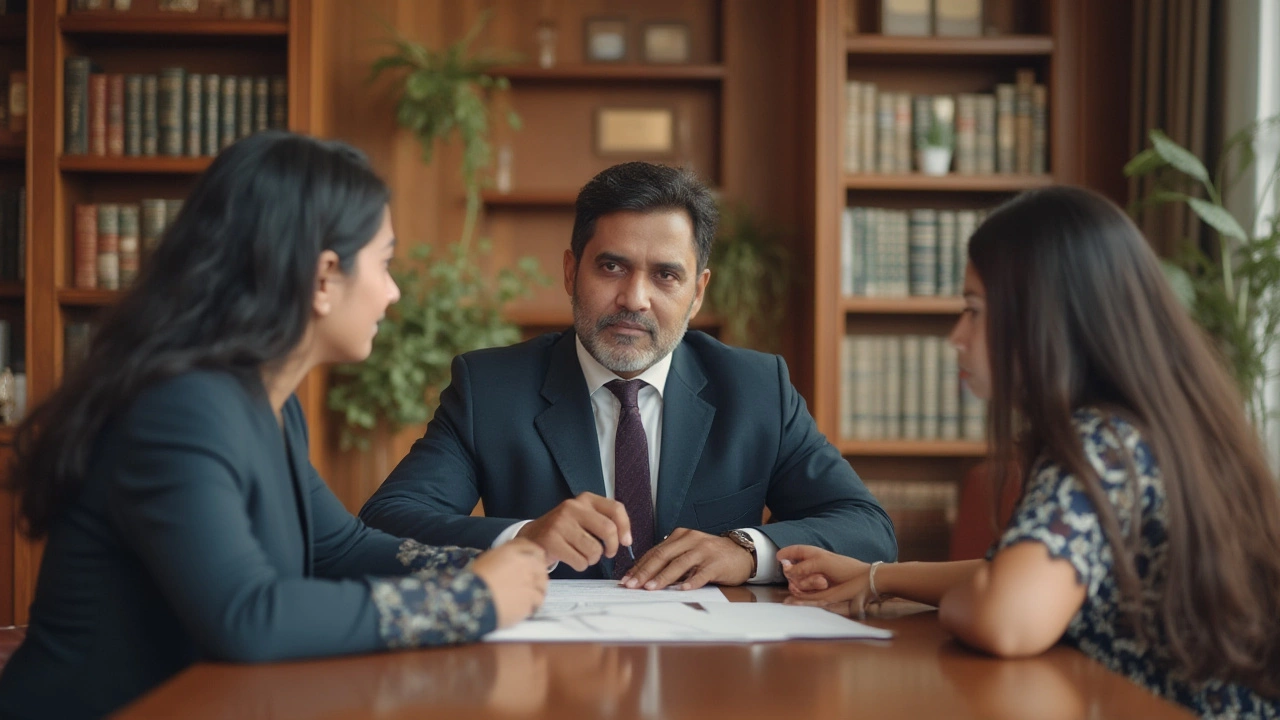Ever thought about what actually happens when families walk into a courtroom? It isn’t all high-drama TV show stuff—real families want real solutions. And if you’re hoping to help navigate those tricky waters, you probably want to know: what’s the best degree for family law? Most people don’t realize the journey doesn’t start (or end) with a single piece of paper. There’s a roadmap, and missing just one turn can leave you stuck in law school limbo. Let’s pull back the curtain and talk honestly about what you need—and why it matters.
The Academic Path to Family Law
Here’s the straight-up truth: if you want to practice family law in the U.S. (like helping with divorces, child custody, or adoption), you’ll need a law degree. But there’s more to it than grabbing a standard JD and calling it a day. Before you get anywhere near a courtroom, you’ll usually start with a four-year undergraduate degree. The sneaky secret? You don’t actually need to major in "pre-law." Colleges don’t have some magic class called "Family Law 101" at the bachelor’s level. Instead, law schools want to see you’ve picked up critical thinking, top-notch writing, and research skills, no matter if you studied political science, psychology, English, or even theater. In fact, a 2023 survey by the American Bar Association (ABA) revealed that political science was the most common major for law school entrants—closely followed by history, psychology, and English. These majors help build the empathy, reasoning, and communication skills that family law careers thrive on.
Once you’ve got your bachelor’s locked in, it’s time to set your sights on the real prize: the Juris Doctor (JD) degree. This is where the rubber meets the road. Accredited U.S. law schools typically want your undergraduate transcript, a solid LSAT or GRE score, and—here’s the kicker—a killer personal statement that explains why you’re fired up about becoming a family lawyer. Getting into a top school can give you more options later, but plenty of great family lawyers come from mid-tier law schools with a focus on public service. Law school lasts three years, and while the first year is pretty much survival mode with classes like contracts, torts, and criminal law, you’ll get the chance to pick electives in your second and third years. Jump on anything related to family law—courses like "Children and the Law," "Mediation and Negotiation," or "Domestic Violence Law" aren’t just resume candy, they actually give you a leg up. If your school offers legal clinics with real clients, grab one, even if you have to fight for the slot; hands-on work is where the book stuff finally makes sense.
By the end of your JD, you’re not just looking for a diploma—you want experience. Courts, nonprofits, and law firms dealing in family law all need eager interns. Hunt these down early. According to data from the National Association for Law Placement (NALP), graduates with real family law experience in law school are 70% more likely to land jobs in the field post-graduation. It’s not just what you’ve studied but who you’ve helped—and who’s noticed your work ethic. After law school, buckle up for the bar exam in your state. Pass it, and you’re officially an attorney. That’s when the real work starts.

Extra Degrees and Specializations: What Actually Helps?
Here’s where people start to get creative—or confused. Do you need a master’s in family law? Will a psychology minor make you stand out? Is there a top-secret advanced degree that judges love? If you’re asking, you’re not alone. Let’s untangle it. Once you’re licensed, you can technically start handling family law cases, from divorce petitions to custody battles. But there’s still room to grow, and for some people, picking up an extra credential can move them ahead of the pack. Some universities (like Loyola Chicago or Hofstra) offer an LLM (Master of Laws) with a focus on family law. LLMs are common for people who want deeper legal expertise or plan to teach, but they’re not required for practicing attorneys. If you know you want to stay at the cutting edge—perhaps international child custody or advanced mediation—then an LLM is worth considering. Still, the majority of successful family lawyers only have a JD.
If you’re thinking, “But I love psychology, too,” you’re not wrong for considering combining these areas. Family law is about people as much as paperwork, and understanding trauma, family dynamics, and mental health gives you a huge advantage. About 30% of family law attorneys, according to an ABA report from 2022, said their undergraduate background in psychology helped them handle complex cases. Schools may let you pick up a graduate-level certificate in mediation or counseling while you’re working as a lawyer, and these extras can absolutely open doors—especially as courts push for more alternative dispute resolution.
Let’s not forget: learning doesn’t stop with degrees. Every state’s bar association offers continuing legal education (CLE) credits, required for maintaining your license. Some lawyers focus these credits entirely on family law subjects, picking up new skills in collaborative divorce or child welfare. Want to boost your credibility? Consider seeking board certification in family law if your state offers it. Board certification requires additional coursework, tons of real-life cases, a heavy exam, and peer reviews. According to the National Board of Trial Advocacy, fewer than 5% of all practicing lawyers hold this credential, so it’s a head-turner for future clients and employers.
| Degree or Specialization | Typical Duration | Advantage in Family Law |
|---|---|---|
| Bachelor’s (any major) | 4 years | Fundamental logic/writing skills |
| Juris Doctor (JD) | 3 years | Essential, includes family law electives/clinics |
| LLM (Family Law) | 1 year post-JD | Deep specialization, teaching positions |
| Mediation/Conflict Certificate | 6 months-1 year | Boosts negotiation/settlement skills |
| Board Certification (Family Law) | Varies | Legal credibility, complex cases |

Landing Jobs and Thriving as a Family Lawyer
So you’ve earned your degrees and you’ve passed the bar. Now what? Finding a job in family law can feel like walking into a maze blindfolded, but there are ways to scout out the exits. Your best shot early on is to join a law firm—big or small—that deals with divorce, custody, or adoption. These places teach you the real-world ropes. Don’t overlook public agencies or legal aid groups; they’re busy, understaffed, and sometimes the best places to rack up hours while helping people who truly need it.
Now, what skills make you actually stand out on the job? The stuff that looks good on a resume isn’t always what helps you survive your first heated custody dispute. Family law is way less about legalese and way more about conversations. If you can listen without judging, break down legal jargon for scared parents, and negotiate with someone on the edge, you’ll be ahead. In fact, data from the Bureau of Labor Statistics says that while lawyer job growth is about average overall (8% expected by 2032), lawyers with conflict resolution skills saw higher job satisfaction and faster salary bumps. Emotional intelligence, quick thinking, and clear communication are your secret weapons—no LSAT prep book will get you those.
Don’t forget the tech side of things. In recent years, more than half of all legal filings in family law have gone digital, according to the National Center for State Courts. Learning legal tech tools (from online filing to secure client communications) will future-proof your career. Young lawyers especially should expect to spend part of each week on the latest software and webinars—if you’re tech-savvy, firms will want you.
Networking is also not just a buzzword here. The American Academy of Matrimonial Lawyers and your local bar association host mixers, lunches, and CLE events packed with people who might become your next mentor or boss. Make friends, ask for advice, and don’t be afraid to volunteer; one introduction is sometimes more powerful than one more certification.
Finally, remember that family law is one of the most emotionally loaded legal fields. Burnout is common. Set boundaries, seek support, and know it’s OK to take breaks. Some of the best family lawyers check in with therapists, join wellness groups, and schedule time away from their phone. Protecting your mental health isn’t just for you—it also helps you be present and effective for your clients.
To wrap it all up: to practice family law degree knowledgeably in 2025, you’ll need a bachelor’s degree (any major that grows your mind), a JD from an accredited law school, and experience built through electives, clinics, and internships. Specializations and certifications help, but real-world empathy, resilience, and communication set the best lawyers apart. The route may not be easy, but if you love helping real people fix real problems, it’s one of the most rewarding jobs out there.
